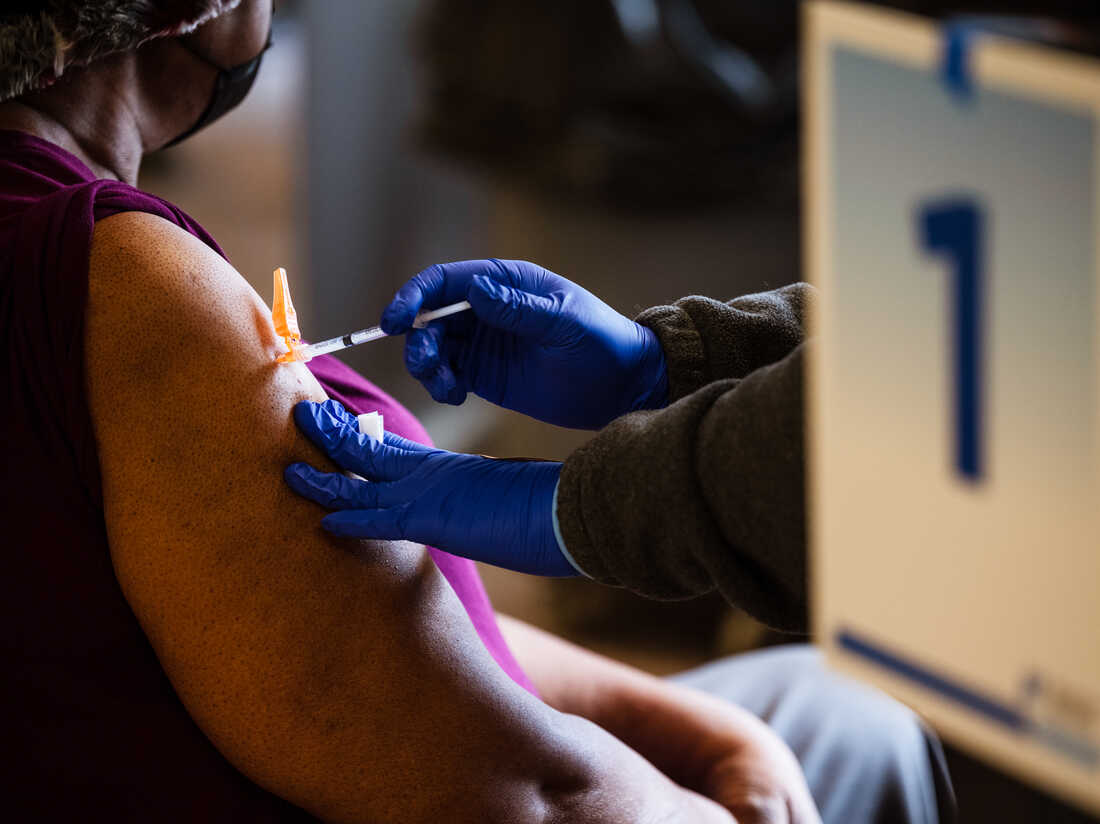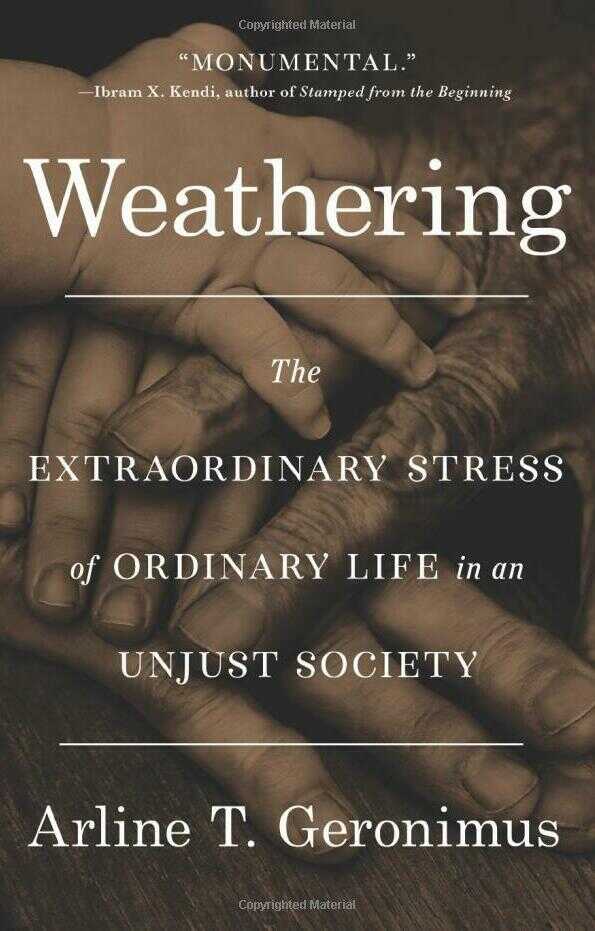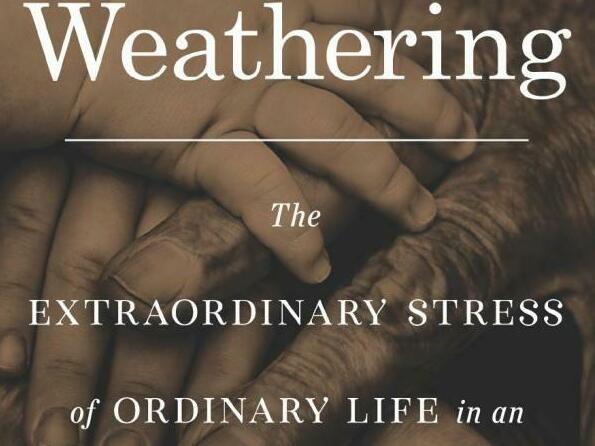[ad_1]

Public well being professor Arline Geronimus says marginalized individuals endure practically fixed stress, which results in more and more critical well being issues over time.
Jon Cherry/Getty Pictures
cover caption
toggle caption
Jon Cherry/Getty Pictures

Public well being professor Arline Geronimus says marginalized individuals endure practically fixed stress, which results in more and more critical well being issues over time.
Jon Cherry/Getty Pictures
In 2020, the general life expectancy within the U.S. dropped by 1.5 years, largely because of the COVID-19 pandemic. However the discount wasn’t shared equally among the many normal inhabitants; Native American individuals misplaced a mean of 4.5 years of life expectancy; Black and Hispanic individuals misplaced, on common, 3 years, whereas white individuals misplaced just one.2 years.
This determine tracks with different well being tendencies: Basically, Black and Hispanic individuals and people residing in poverty within the U.S. have worse well being outcomes — extra hypertension, larger charges of diabetes and elevated maternal and toddler mortality — than the general inhabitants.
Public well being researcher Arline Geronimus from the College of Michigan says the normal perception that the disparities are because of genetics, eating regimen and train do not clarify knowledge that is gathered over time. As a substitute, she makes the case that marginalized individuals endure practically fixed stress from residing with poverty and discrimination, which damages their our bodies on the mobile stage and results in more and more critical well being issues over time.
Geronimus coined a time period for this persistent stress — she calls it “weathering,” which, she says, “actually wears down your coronary heart, your arteries, your neuroendocrine programs, … all of your physique programs in order that in impact, you develop into chronologically outdated at a younger age.” She writes in regards to the phenomenon in her new ebook, Weathering: The Extraordinary Stress of Peculiar Life in an Unjust Society.
Geronimus’ theories drew criticism when she first promoted them within the Nineteen Nineties. However in recent times, her work has generated a wealth of assist. She says weathering helps clarify why Black ladies who give delivery of their 20s have extra issues than those that develop into moms of their teenagers. The older ladies had endured the stress of their tough residing situations longer, she says, and thus had suffered extra harm to their well being.
“It is not that each Black individual has extra harm than each white individual,” she says. “It is actually about how a lot stress versus social assist you get in your on a regular basis life. … As a result of African People and low-income People usually tend to endure extra of those stressors, they’re extra more likely to be weathered, weathered severely and weathered at youthful ages.”
Interview Highlights


On how the physique’s pure stress response can result in weathering
Human our bodies have advanced, and the rationale we’ve not gone extinct but is as a result of after we’re confronted with an acute, life-threatening problem, our physique routinely prompts this launch of hormones. And what these hormones do as they flood your physique is that they enhance your coronary heart fee. They enhance your respiratory fee. They propel oxygenated blood to your giant muscle tissues shortly. … They provoke fat and sugars out of your storage areas of your physique into the bloodstream to supply power in the direction of that capability to struggle or flee. …
That course of, once you’re preventing or working from the cheetah, is an excellent adaptive course of that’s designed to final about three minutes. …
The issue within the fashionable world is … loads of [stress] is just on a regular basis life: Coming house after night time shift work and having to remain unsleeping and vigilant so you do not neglect to get off your bus for the following bus to go house. Attempting to get your youngsters up for varsity at 5 within the morning so you may also get to work. … Because of this the stress hormones are chronically flooding your physique. The fat and sugars that you just catapulted into your bloodstream for power are continuously flooding your physique.
It means your coronary heart fee is up, [and] like some other over-exercised muscle, you will begin to get an enlarged coronary heart. You will begin to get hypertension from pushing a lot blood by means of sure arteries and veins to get your coronary heart fee going and your respiratory going. For those who had been pregnant, you may lose your child, as a result of it is really in all probability extra adaptive in case you’re in struggle or flight to not be carrying a child. However even in case you do not lose the child, you will shunt vitamins away from it as a result of they cannot be spent on the rising child. And so your child could also be born low delivery weight or progress retarded as a result of it hasn’t been properly nourished within the womb.
On why middle- and upper-class “stress” is not the identical
[More affluent people] can take holidays. They’ll rent individuals to do their house responsibilities and even order their meals to be delivered. It is not a relentless day in, day trip. They nonetheless have many decisions. They nonetheless have time to calm down. They don’t seem to be coping with the stereotypical racism side that can also activate this course of. So the issue is “stress” is that this very diffuse time period. And we consider it as one thing you possibly can simply meditate your manner out of or take a trip or a break. Many individuals in our nation cannot even take a break throughout working hours.
On enhancing maternal mortality fee
Maternal mortality nonetheless retains going up. … However I believe increasingly more persons are understanding that systematic racism within the medical care system is a part of the issue. There are methods round it, whether or not these methods are having delivery attendants who’re doulas or midwives, quite than physicians; having your delivery at house. Methods the place you can be much less pressured throughout and really feel safer throughout the delivery could make a distinction. However at this level we do not have sufficient midwives or doulas or maternity-care suppliers in any respect. We now have about one maternity-care supplier per 15,000 births, and that is not unfold evenly over the nation. … So we additionally need to do issues that get extra individuals educated, and educated not simply as OB-GYNs however as midwives and doulas.
On learning why Latin American immigrants, reminiscent of these from Mexico, have worsening well being the longer they’re within the U.S.
You are a fish out of water. For those who’ve been raised in an immigrant household from Mexico, and then you definitely’re transferring into predominantly white, American, prosperous and well-educated communities and establishments, … the place you do not share the identical assumptions or background, the place the individuals you are working with do not recognize all you have been by means of, the place you are having to all the time be in your guard and handle the way you painting your self or current your self to attempt to not fulfill stereotypes that you just assume individuals you are working with or going to high school with may need about you. ….
And meaning you are at a sure stage of vigilance and on the lookout for cues all over the place of whether or not you belong, whether or not you are welcome, whether or not you are going to be topic to what many individuals name microaggressions. … These experiences themselves may cause weathering.
On how social mobility of minorities doesn’t suggest much less stress
[Our health is] an indicator of … the context that we stay in, of a society that’s racist, oppressive, class aware. … We can’t remedy well being inequalities between Blacks and whites or Latinx and whites or different teams just by getting individuals extra schooling or larger incomes. This persistent stress arousal is extra possible in these sorts of unsupportive environments than … the extra supportive environments, in case you follow your personal group. Weathering is just not towards social mobility, it is not for segregation, it is for non-erasure. It is for seeing and recognizing what is admittedly taking place, and what it does to you biologically, and realizing if we wish to get rid of well being disparities or promote well being fairness, we’ve to take care of what’s taking place in these totally different settings.
Audio interview produced and edited by: Heidi Saman and Thea Chaloner. Audio interview tailored for NPR.org by: Bridget Bentz, Molly Seavy-Nesper and Carmel Wroth.
[ad_2]



